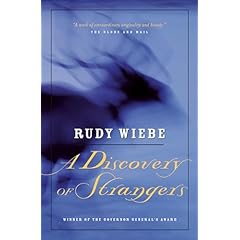
I've been wanting to read some Rudy Wiebe, and A Discovery of Strangers was the book that I happened to find while used book shopping in Kenora. My copy bears a silver "Winner of the Governor General's Award for Fiction 1994" label on the front, so I figured that it was worth a shot.
The story is creative. It examines the first meetings and interactions of the British and the Tetso'ine ("Yellowknives") as a mutual discovery of strangers. (Both groups think the other bizarre and somewhat foolish, secretly laugh at each other's creation stories, etc.) The story is also very carnal--consisting mostly of sex and survival--which I suppose would have been the main concerns of all people concerned at that point in time. I think I'd be careful about who I recommended this book to, so that they didn't think I was too wierd.
Other Wiebe books I'd like to read:
-Of This Earth
-Sweeter Than All the World
-Peace Shall Destroy Many
In a quick cut-and-paste effort, here's a good quote from a publisher's spotlight that explains, I think, why I'm so curious about Weibe:
Wiebe was called the first major Mennonite writer to place his community’s experience in a broader framework. Mennonites assert the fundamental authority of Scripture, especially the New Testament, as a practical guide to life. But while Wiebe imbues his work with a deep moral seriousness, his focus has always been on narrative. “I never consciously think of writing a so-called Christian novel. I don’t think Albert Camus ever thought of writing an existentialist novel, either. I think of getting at, of building, a story.” As a prairie writer, he has often concerned himself with Native stories, feeling place of birth to be more important than blood ancestry. “Those Mennonite villages in Russia are my heritage, but not my world. The world I feel and sense in my bones is the bush of northern Saskatchewan, of prairie Canada.” Native spirituality, with its vital links to the physical world, has always attracted him. But his fiction manages to transcend nationality and locale to explore the struggles of communities and individuals; his books and stories have been translated into nine European languages, as well as Chinese, Japanese and Hindi.
No comments:
Post a Comment